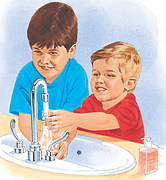RSV (Respiratory Syncytial Virus) Infection
RSV (respiratory syncytial virus) is the major cause of lung infections in young children and babies. RSV is so common that virtually all children have been infected with the virus by the age of 3. Many children have the illness more than once. RSV usually results in mild, cold-like symptoms. In some cases, it can cause serious lung infections and breathing problems. Because of this, it is important to know what to do if you suspect serious RSV infection.
 |
| Frequent handwashing helps prevent the spread of RSV. |
How RSV Spreads
RSV spreads easily from person to person through fluids from the nose and mouth of an infected person. It spreads quickly in group settings, such as daycare and schools.
Symptoms of RSV
Most babies and children with an RSV infection have the same symptoms they might have with a cold or flu. These include a stuffy or runny nose, a cough, headache, and a low fever.
Treating RSV
Treatment will focus on relieving your child’s symptoms and ensuring that the infection does not get worse. Antibiotics are not useful against viruses, so they are not prescribed. Try the following to help your child feel more comfortable and get better faster:
-
Feed your child plenty of clear, room-temperature fluids, such as water or apple juice.
-
Make sure your child gets plenty of rest.
-
Keep an infant’s nose clear using a rubber bulb suction device to remove any mucus.
-
Elevate your child’s head slightly with pillows to make breathing easier.
-
Run a cool-mist humidifier or vaporizer in your child’s room to keep the air moist and nasal passages clear.
-
Do not let anyone smoke around your child.
When to Call the Doctor
Call your doctor right away if your child has any of the following:
-
A fever higher than 101°F
-
A harsh or persistent cough
-
Wheezing, breathing faster than usual, or trouble breathing
-
Nausea or vomiting
-
Flaring of the nostrils or straining of the chest or stomach while breathing in
-
Restless or irritable, unable to be soothed
-
Unusually drowsy or listless
-
Less urination or dry mouth or cracked lips
-
Trouble eating, drinking, or swallowing
|
Preventing RSV Infection
To help prevent the infection:
-
Wash your hands often with warm water and soap.
-
Have your child wash his or her hands often.
-
Monitor your own health and that of family members and playmates and prevent contact between the child and those with a cold or fever.
-
Do not smoke around your child.
-
Ask your doctor if your child is at high risk and should receive monthly injections to prevent infectious diseases like RSV.
© 2000-2024 The StayWell Company, LLC. All rights reserved. This information is not intended as a substitute for professional medical care. Always follow your healthcare professional's instructions.